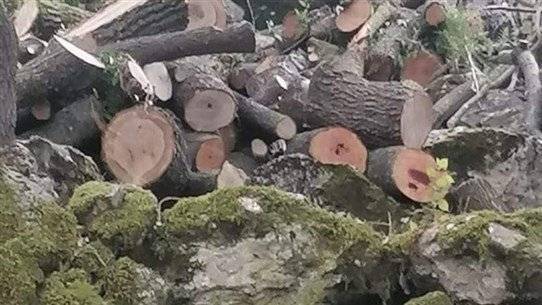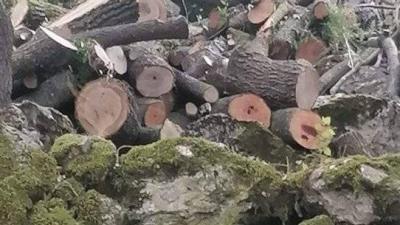No sound is louder than the sound of the saw these days, as it devours trees in various villages of the South. Dozens of trees have become targets for the wood traders' saws, who commit their crimes mostly under the cover of darkness. Firewood is a thriving and profitable business these days, especially as people resort to it. Clearly, the price per meter will be based on the exchange rate, even though most of it is stolen and pillaged from the forests of the South and trees extending along the roads. Environmental massacres are committed daily, from the forests of Wadi al-Hijjar to the forest of Tallet al-‘Askar, among many others. Additionally, police from several municipalities in Nabatiyeh have been cutting trees under the pretext that they cause damage to the electricity network, turning them into firewood for sale. All these massacres have not faced any reaction from environmental protectors; there has been no fierce attack on the perpetrators. It is no secret that most of the fires that ignite here and there are for the sake of firewood, even at the cost of the threatened environmental cover today.
Ahmad confirms the existence of "thieves" targeting trees these days. According to him, every day he notices a reduction in the number of trees in the forest of Tallet al-‘Askar—every day, a group of trees diminishes without accountability. The forest of Tallet al-‘Askar is one of the most beautiful forests in Nabatiyeh; it is a crime to witness the massacre being committed against it by the saws of firewood thieves.
On another note, the cutting of "Leylandii" trees from the premises of the Union of Municipalities of the Sheqif stirred controversy, especially since it occurred at a time when many were racing to cut trees to turn them into firewood for heating. Dozens of trees are cut daily in the forests of the Nabatiyeh area, day and night, most of which are forest trees, involved in the firewood trade that has started to flourish with the onset of winter and the rising demand due to the increase in diesel prices and its scarcity. These trees have received no support; no one has taken action to defend them against the saws of woodcutters that have devoured greenery these days, remaining concealed—unlike the Leylandii trees, whose cutting sparked wide debate and filled social media platforms, even though they are "ornamental trees and not forest trees."
The cutting of these trees threatens the safety of the adjacent eight-story building, as their roots have penetrated the main support walls of the warehouse. This prompted the building owner, Ahmad al-Khayat, to lodge a complaint with the Union of Municipalities of the Sheqif regarding the threat posed by the trees to the building. According to al-Khayat, "The roots of the Leylandii tree have cut through the metal in the warehouse, and these walls are the foundations of the building; any flaw in them threatens the safety of the residents."
After a team from the union conducted an inspection and assessed the damage, a decision was made to cut the trees. The union did not delay in deciding to cut the trees without referring to the Ministry of Agriculture, considering them "ornamental trees, and the law allows cutting them without prior permission," according to Abd al-Rida Shuaib, the financial officer at the Union of Municipalities of the Sheqif. "The trees began to threaten the safety of the building after their roots expanded into its foundations, and after the engineering inspection and to remove the existing damage, we proceeded with their removal."
Shuaib admits that "no approval was obtained from the Ministry of Agriculture, based on the law permitting such action; however, he claims he was unaware of a circular issued by the ministry prohibiting even the cutting of ornamental trees without the consent of the Ministry of Agriculture. He asserts that "the union, after addressing the damage, will replant flower beds in their place, as the union's policy is to enhance green spaces, not reduce them."
Thus, the trees were cut without prior permission from the Ministry of Agriculture, which learned of the tree cutting incident only later, prompting it to conduct a field inspection of the cut trees and issue a report against the union. According to ministry sources, the violation committed by the union was that it executed the tree-cutting operation without consulting them, but they affirm significant damage was caused to the foundations of the adjacent building, and sources do not hide that if the request had been submitted to them, they would have granted permission for the cutting since it posed a threat to the safety of an eight-story building. According to the sources, the report will be submitted to the public prosecutor in Nabatiyeh for action.
The incident regarding the cutting of Leylandii trees passed without serious repercussions, but the cutting of forest trees should not go unchallenged; it must be deterred before the forests turn into barren land.




